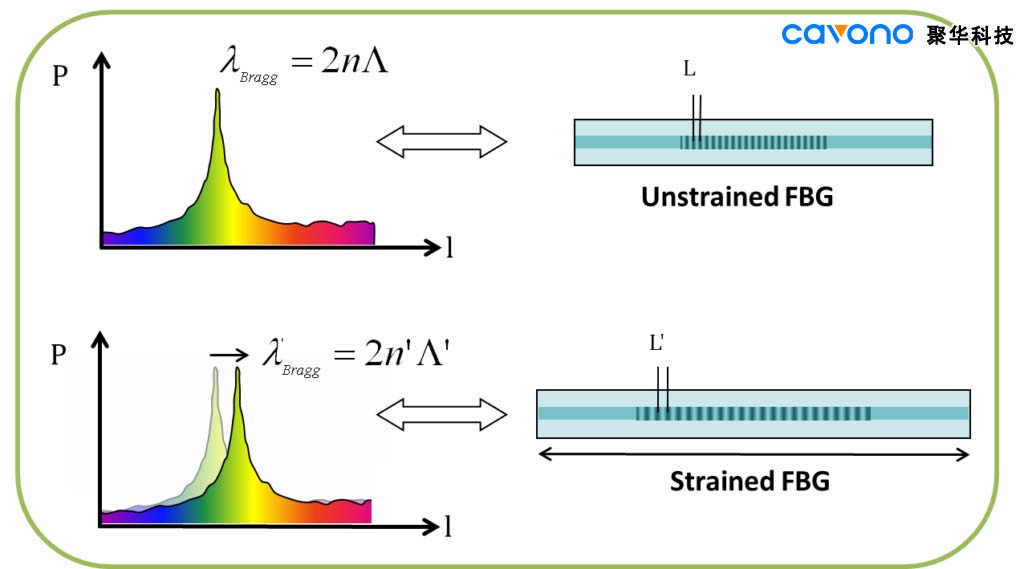Fiber Bragg Gratings are made by laterally exposing the core of a single-mode fiber to a periodic pattern of intense laser light. The exposure produces a permanent increase in the refractive index of the fiber’s core, creating a fixed index modulation according to the exposure pattern. This fixed index modulation is called a grating.
At each periodic refraction change a small amount of light is reflected. All the reflected light signals combine coherently to one large reflection at a particular wavelength when the grating period is approximately half the input light’s wavelength. This is referred to as the Bragg condition, and the wavelength at which this reflection occurs is called the Bragg wavelength. Light signals at wavelengths other than the Bragg wavelength, which are not phase matched, are essentially transparent. This principle is shown in Figure 1.

Therefore, light propagates through the grating with negligible attenuation or signal variation. Only those wavelengths that satisfy the Bragg condition are affected and strongly back-reflected. The ability to accurately preset and maintain the grating wavelength is a fundamental feature and advantage of fiber Bragg gratings.
The central wavelength of the reflected component satisfies the Bragg relation: λBragg = 2nΛ, with n the index of refraction and Λ the period of the index of refraction variation of the FBG. Due to the temperature and strain dependence of the parameters n and Λ, the wavelength of the reflected component will also change as function of temperature and/or strain, see Figure 2. This dependency is well known what allows determining the temperature or strain from the reflected FBG wavelength.

关于聚华科技
杭州聚华光电科技有限公司是一家基于物联网光纤传感器技术从事土木工程结构健康监测与预警管理的高新技术企业,聚华是专业的光纤光栅传感器产品提供商和土木工程结构健康监测一站式解决方案优质合作伙伴。公司专注于桥梁、隧道、边坡、基坑、地铁、矿山、电力等土木工程领域的结构健康监测相关产品的研发、生产、推广与应用,以提供野外光纤传感器自动化监测产品、工程结构安全监测一站式解决方案见长。主要以光纤光栅传感器技术、分布式光纤测温技术、工程安全自动化云计算软件、工程化专业领域数据分析为技术核心。www.cavono.com
At each periodic refraction change a small amount of light is reflected. All the reflected light signals combine coherently to one large reflection at a particular wavelength when the grating period is approximately half the input light’s wavelength. This is referred to as the Bragg condition, and the wavelength at which this reflection occurs is called the Bragg wavelength. Light signals at wavelengths other than the Bragg wavelength, which are not phase matched, are essentially transparent. This principle is shown in Figure 1.

Figure 1: Working principle of FBG
Therefore, light propagates through the grating with negligible attenuation or signal variation. Only those wavelengths that satisfy the Bragg condition are affected and strongly back-reflected. The ability to accurately preset and maintain the grating wavelength is a fundamental feature and advantage of fiber Bragg gratings.
The central wavelength of the reflected component satisfies the Bragg relation: λBragg = 2nΛ, with n the index of refraction and Λ the period of the index of refraction variation of the FBG. Due to the temperature and strain dependence of the parameters n and Λ, the wavelength of the reflected component will also change as function of temperature and/or strain, see Figure 2. This dependency is well known what allows determining the temperature or strain from the reflected FBG wavelength.

Figure 2: FBG response as function of strain
关于聚华科技
杭州聚华光电科技有限公司是一家基于物联网光纤传感器技术从事土木工程结构健康监测与预警管理的高新技术企业,聚华是专业的光纤光栅传感器产品提供商和土木工程结构健康监测一站式解决方案优质合作伙伴。公司专注于桥梁、隧道、边坡、基坑、地铁、矿山、电力等土木工程领域的结构健康监测相关产品的研发、生产、推广与应用,以提供野外光纤传感器自动化监测产品、工程结构安全监测一站式解决方案见长。主要以光纤光栅传感器技术、分布式光纤测温技术、工程安全自动化云计算软件、工程化专业领域数据分析为技术核心。www.cavono.com